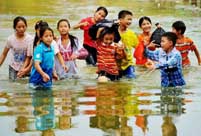Japan's Ministry of Agriculture, Forestry and Fisheries on Monday sent a senior official to South Korea to protest its ban on fisheries products from eight prefectures in Japan, imposed over safety fears concerning radioactive water leaking from the crippled Fukushima nuclear power plant.
Kenji Kagawa, the director-general of the fisheries agency's Resources Enhancement Promotion Department, will meet with South Korean officials from both the Ministry of Oceans and Fisheries and the Ministry of Food and Drug Safety, and hear their explanations for imposing the ban.
According to the fisheries agency, Kagawa will seek to have the ban reversed and the Japanese government is also considering filing a suit against South Korea with the World Trade Organization (WTO) for the import ban to add further pressure on Seoul to have the ban lifted.
On Sept. 6, Japan's Chief Cabinet Secretary Yoshihide Suga maintained that Japanese food and water are subjected to the world 's most stringent inspections that are in accordance with international standards and based on this implored South Korea to view Japan's food exports from a scientific stance.
Suga said in cases where food products test positive for radiation in excess of international standards, the products are not shipped overseas and reiterated that the Pacific Ocean has not been adversely affected by the radioactive leaks at the stricken Fukushima plant in Japan's northeast.
South Korea, however, upheld its ban on all fisheries products from Fukushima, Aomori, Ibaraki, Gunma, Miyagi, Iwate, Tochigi and Chiba prefectures, stating that the ban would be upheld regardless of levels of radioactivity found in the products.
Japan's moves to involve the WTO are also in a bid to prevent other countries from slapping bans on Japan's food and fisheries exports, sources close to the matter said here Monday, as a growing number of countries are demanding increased certification of safety from Japan on its exports.
But while the WTO accepting Japan's suit would be an unprecedented move by the organization, with analysts believing the suit may be rejected, Japan is also in talks with European Union and Middle Eastern nations to ease their import restrictions in the wake of the Fukushima disaster, in a bid to mitigate a growing strain on Japan's food export industries.
South Korean Prime Minister Chung Hong-won's office initially said its decision to impose the ban was made following mounting public concerns after radiation-contaminated water leaked from the Fukushima nuclear plant into the adjacent Pacific Ocean.
The South Korean government cited the failure of the plant's operator, Tokyo Electric Power Co., and the government here in providing clear information to the international community to allow overseas governments to fully assess and determine the exact level of risk posed by the leaking plant.
 Pakistan suffers desperate shortage of water
Pakistan suffers desperate shortage of water Lanzhou MAC conducts actual-troop live-ammunition drill
Lanzhou MAC conducts actual-troop live-ammunition drill Heritage train ride across western Kosovo
Heritage train ride across western Kosovo Heavy rain hits Hangzhou, causing traffic jam
Heavy rain hits Hangzhou, causing traffic jam Students wade through water to school
Students wade through water to school Dabaiyi wedding ceremony in China's Yunnan
Dabaiyi wedding ceremony in China's Yunnan Harbin named Chinese city with most beautiful women
Harbin named Chinese city with most beautiful women Weekly Sports Photos: Bale transfers to Real Madrid
Weekly Sports Photos: Bale transfers to Real Madrid Funniest photos of sport stars as kids
Funniest photos of sport stars as kids  Residences of the royal house of Savoy
Residences of the royal house of Savoy China's frigate 'Bengbu'in fire training
China's frigate 'Bengbu'in fire training The last days of Wan Aihua
The last days of Wan Aihua Highlights at 12th National Games of China
Highlights at 12th National Games of China Beijing Film Academy welcomes freshmen
Beijing Film Academy welcomes freshmen 2013 Taiwan Int'l Tourism Expo kicks off in Taipei
2013 Taiwan Int'l Tourism Expo kicks off in TaipeiDay|Week|Month